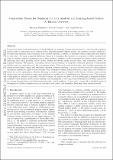Contraction theory for nonlinear stability analysis and learning-based control: A tutorial overview
Author(s)
Tsukamoto, Hiroyasu; Chung, Soon-Jo; Slotine, Jean-Jaques E.
DownloadAccepted version (2.699Mb)
Open Access Policy
Open Access Policy
Creative Commons Attribution-Noncommercial-Share Alike
Terms of use
Metadata
Show full item recordAbstract
Contraction theory is an analytical tool to study differential dynamics of a non-autonomous (i.e., time-varying) nonlinear system under a contraction metric defined with a uniformly positive definite matrix, the existence of which results in a necessary and sufficient characterization of incremental exponential stability of multiple solution trajectories with respect to each other. By using a squared differential length as a Lyapunov-like function, its nonlinear stability analysis boils down to finding a suitable contraction metric that satisfies a stability condition expressed as a linear matrix inequality, indicating that many parallels can be drawn between well-known linear systems theory and contraction theory for nonlinear systems. Furthermore, contraction theory takes advantage of a superior robustness property of exponential stability used in conjunction with the comparison lemma. This yields much-needed safety and stability guarantees for neural network-based control and estimation schemes, without resorting to a more involved method of using uniform asymptotic stability for input-to-state stability. Such distinctive features permit systematic construction of a contraction metric via convex optimization, thereby obtaining an explicit exponential bound on the distance between a time-varying target trajectory and solution trajectories perturbed externally due to disturbances and learning errors. The objective of this paper is therefore to present a tutorial overview of contraction theory and its advantages in nonlinear stability analysis of deterministic and stochastic systems, with an emphasis on deriving formal robustness and stability guarantees for various learning-based and data-driven automatic control methods. In particular, we provide a detailed review of techniques for finding contraction metrics and associated control and estimation laws using deep neural networks.
Date issued
2021Department
Massachusetts Institute of Technology. Nonlinear Systems LaboratoryJournal
Annual Reviews in Control
Publisher
Elsevier BV
Citation
Tsukamoto, Hiroyasu, Chung, Soon-Jo and Slotine, Jean-Jaques E. 2021. "Contraction theory for nonlinear stability analysis and learning-based control: A tutorial overview." Annual Reviews in Control, 52.
Version: Author's final manuscript
ISSN
1367-5788